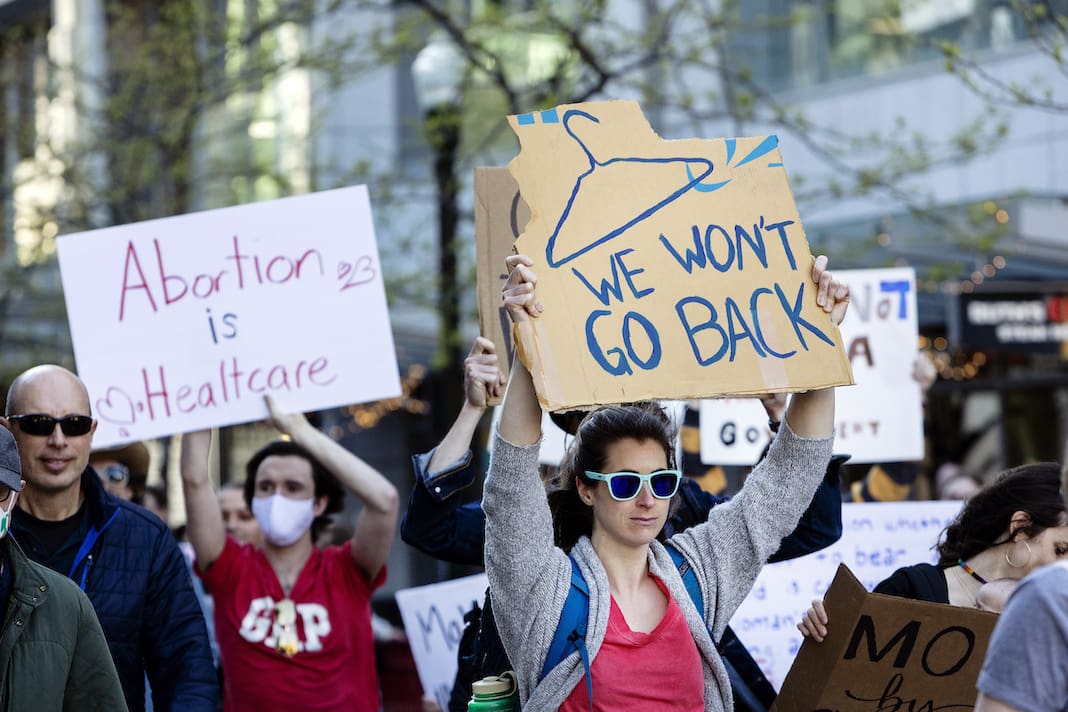Amy Coney Barrett says your right to birth control is safe. She's wrong.
Her record tells an entirely different story.

On Wednesday, the third day of her Supreme Court confirmation hearings, Judge Amy Coney Barrett continued to bob and weave, dodging questions about voting rights and whether Medicare is constitutional. But her refusal to address a decades-old case may have been the most alarming, highlighting that birth control, not just abortion, is at risk if she joins the court.
Barrett was asked by Sen. Chris Coons (D-DE) whether she would agree that Griswold v. Connecticut was correctly decided. The Griswold Court held it was unconstitutional for Connecticut to ban the use of contraception by married couples. It did so by finding that the Constitution, though it does not directly mention a right to privacy, protects privacy via reading several amendments together.
Eight years later, the right to privacy established in Griswold became one of the foundations of Roe v. Wade. Roe found a constitutional right to abortion in part because there’s a fundamental right to marital, familial, and sexual privacy.
The fact Griswold leads to Roe is likely why Barrett refused to answer Coons. Instead, she said it was “unthinkable that any legislature would pass such a law” banning the use of contraception.
She went on to say that she “couldn’t opine on” Griswold because it “does lie at the foundation of that line of precedent,” leading to the decision in Roe.
After Coons, Republican Sen. Josh Hawley of Nebraska picked up the thread, asking Barrett if she was aware of any case challenging the constitutionality of Griswold in the last several decades. Barrett indicated she was not.
Hawley’s questioning, likely accidentally, got at the heart of what is incoherent about Barrett’s response. Hawley appeared to be trying to help bolster the notion that no one is litigating over Griswold, and these concerns are misplaced. However, that line of questioning undercuts Barrett’s answer to Coons, which is that she can’t answer questions about Griswold because it forms the basis of a live controversy in abortion cases.
They can’t have it both ways.
Further, Hawley and Barrett are both wrong that there haven’t been attempts to criminalize the use of birth control. In 2019 in Ohio, fully one-fifth of the Statehouse lined up behind a bill that would have banned “drugs or devices used to prevent the implantation of a fertilized ovum.”
Jaime Miracle, the deputy director of NARAL Pro-Choice Ohio, pointed out that definition would include birth control pills and IUDs, which arguably can stop a fertilized egg from implanting.
Similarly, in 2019, researchers at progressive group One Wisconsin Now learned that two dozen of that state’s legislators had endorsed the aims of Pro Life Wisconsin, which opposes all forms of contraception other than “natural family planning,” one of the least effective methods according to research.
In 2011, Mississippi put a “personhood” amendment before voters, seeking to define a “person” as “every human being from the moment of fertilization, cloning, or the functional equivalent thereof.”
A spokesperson for one of the groups pushing the bill, Personhood USA, said that “any birth control that ends the life of a human being will be impacted by this measure” and went on to agree that would include the birth control pill. And in 2017, Kristan Hawkins, the president of anti-choice group Students for Life, told MSNBC’s Joy Reid she thinks birth control pills and IUDs should be illegal.
It’s demonstrably false that conservative anti-abortion groups and legislators haven’t made moves to ban birth control. Moreover, there’s no need to speculate as to whether Barnett agrees with the “personhood” idea.
In 2006, she publicly supported St. Joseph County Right to Life, which believes life begins at fertilization. Prior to Notre Dame students leaving for the March for Life in 2013, Notre Dame magazine wrote about Barrett speaking to them about “her own conviction that life begins at conception.” In 2015, she signed an open letter talking about “the value of human life from conception to natural death.”
Barrett’s also spoken at events sponsored by the Alliance Defending Freedom, a group that believes that allowing doctors to talk about birth control options to patients is the same as “bullying women into not reproducing.”
Conservatives who share Barrett’s views have also filed lawsuit after lawsuit seeking to limit birth control access. This past summer, the Trump administration prevailed at the Supreme Court when it upheld a regulation allowing employers with any moral or religious objections to opt out of Obamacare’s requirement that they provide birth control coverage.
Conservatives are smart to be cagey about their goal of outlawing birth control — because it’s is wildly popular. A Centers for Disease Control and Prevention study found that, from 2015 to 2017, almost 65% of all women of reproductive age use birth control. And over 99% of all women aged 15-44 who’ve had sex report using at least one method of contraception.
If Barrett is confirmed, she’ll join Justice Brett Kavanaugh, who is on record saying that birth control and emergency contraception are “abortion-inducing drugs.”
The views of both Barrett and Kavanaugh are far outside the mainstream, but that doesn’t matter. Conservatives have engaged in a decadeslong crusade to demonize birth control by saying it is the same as abortion. Barrett has been a part of that crusade. Couple that with her refusal to state that Griswold was rightly decided, and it’s clear that birth control, not just abortion, is at stake.
Published with permission of The American Independent Foundation.
Recommended

Ohio doctors fear effects of emergency abortion care case set to go before U.S. Supreme Court
A federal law that allows emergency departments to treat patients without regard to their ability to pay will be under U.S. Supreme Court scrutiny this week, and Ohio doctors are concerned about the case’s local impact on emergency abortion care.
By Susan Tebben, Ohio Capital Journal - April 23, 2024
Biden on abortion rights: President expects to give speech Tuesday on new Florida 6-week ban
‘Having the president of the United States speaking out loud and with confidence about abortion access is a great thing’
By Mitch Perry, Florida Phoenix - April 22, 2024
Group launches effort to explore ballot initiative restoring abortion access in Idaho
Organizers say fundraising begins now for inclusion on the 2026 ballot
By Kelcie Moseley-Morris, Idaho Capital Sun - April 19, 2024







































































